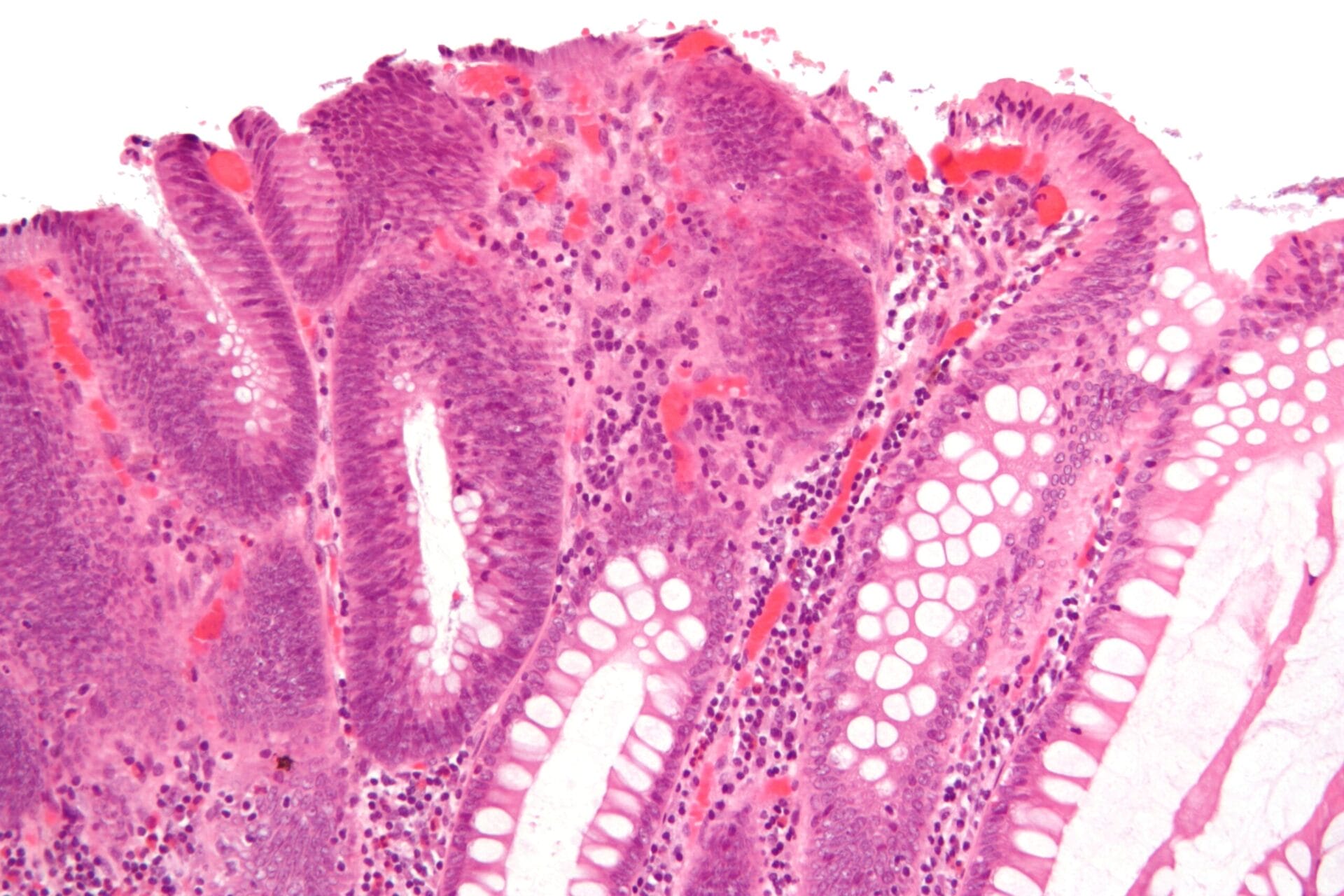What is familial adenomatous polyposis?
Image credit: Nephron / via Wikimedia Commons

Familial adenomatous polyposis is an inherited genetic condition that makes people more likely to develop early-onset colorectal cancer and some other cancer types.
- Familial adenomatous polyposis is a very rare condition that affects around 1 in 7,000 people. It increases a person’s risk of developing colorectal cancer, accounting for just under 1% of colorectal cancer cases.
- It causes large numbers of growths in the bowel that are at high risk of becoming cancerous.
- The average age of onset of colorectal cancer in people with familial adenomatous polyposis is 39 years.
What is familial adenomatous polyposis?
- Familial adenomatous polyposis is an inherited condition that increases a person’s chance of developing colorectal cancer.
- It’s caused by mutations in the adenomatous polyposis coli (APC) gene, found on chromosome 5. Scientists have identified many mutations in APC that can cause familial adenomatous polyposis.
- Familial adenomatous polyposis is a dominant genetic condition. This means that only one copy of the mutated APC gene is needed for the individual to have the syndrome.
- Each child born to a person with familial adenomatous polyposis has a 50 per cent chance of inheriting the mutated gene. Many people with familial adenomatous polyposis are diagnosed because they have an affected relative, leading to genetic testing.
What is the biology of familial adenomatous polyposis?
- APC is a tumour suppressor gene. When fully functional, it prevents irregular cell growth to stop tumours from forming.
- A mutation in the APC gene can affect the ability of a cell to maintain normal growth and function. This can cause them to grow out of control.
- This cell overgrowth leads to the formation of colorectal polyps, characteristic of familial adenomatous polyposis – giving the condition its name.
- Although these polyps are not initially cancerous, they have a high risk of developing a mutation in the second copy of their APC gene, causing them to become cancerous.
- Most people with mutations in one or both copies of the APC gene will develop colorectal cancer in their lifetime. However, the number of polyps and time frame in which they become cancerous depends on the specific mutation.
What are the symptoms of familial adenomatous polyposis?
- Hereditary non-polyposis colorectal cancer is called ‘early onset’ cancer.
- If left untreated, almost all people with the condition will develop colorectal cancer by the time they are 50 years old. Most will develop colorectal cancer between 34 and 43 years.
- Some people have a variant called attenuated familial adenomatous polyposis where onset is delayed to an average of 55 years.
- Familial adenomatous polyposis usually has no symptoms until a person reaches their teens and twenties, when they develop many protruding, non-cancerous growths in their colon. These are called adenomatous colorectal polyps.
- The more polyps a patient has, the higher the chance of cancer.
- Common symptoms of polyp formation and colorectal cancer include:
- rectal bleeding.
- tummy pain.
- bony growths.
common cancer-related symptoms such as unexplained weight loss and fatigue.
- Some people may also develop polyps in their small intestine, called duodenal polyps.
How is familial adenomatous polyposis diagnosed?
- Generally, familial adenomatous polyposis is suspected if there is a history of colorectal cancer in the biological family at a young age.
- To be diagnosed with the familial adenomatous polyposis, patients need to have more than 100 colorectal polyps in their colon and rectum, as confirmed with a flexible colonoscopy – which involves a doctor inserting a small camera (an endoscope) up the bottom of the patient to view their colon.
- To be diagnosed, they also need to have a relative with confirmed familial adenomatous polyposis.
- The upper gastrointestinal tract can also be checked for polyps using an endoscope inserted down the throat.
- People can be tested for familial adenomatous polyposis using genetic testing to see if they have a mutation in the APC gene. This is usually done in partnership with a genetic counsellor.
How is familial adenomatous polyposis treated and managed?
- Some people with familial adenomatous polyposis might choose to have their large bowel surgically removed to reduce their risk of polyps and colorectal cancer.
- Others will have regular checkups with a specialist doctor, including regular colonoscopies to look for and monitor polyps.
- Small polyps can be removed using an endoscope, but large or cancerous polyps need to be removed surgically.
- Lifelong follow-up is required to ensure that other cancerous polyps are caught as early as possible.